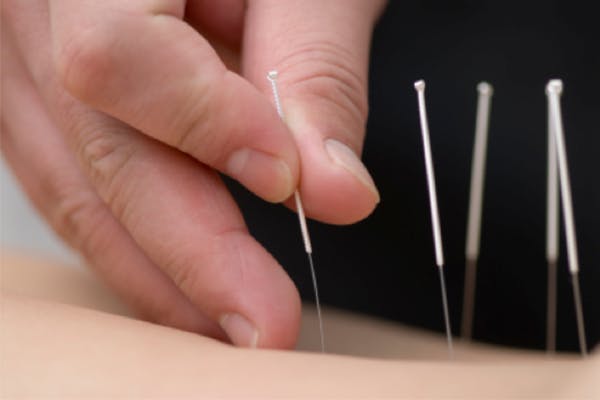By: Dr. Richard DeFalco, DPT, OCS, CSCS, CWcHP, Cert. DN
At Professional Rehabilitation Services one of the major tenants of our mission in an effort to provide the highest quality of physical therapy is to learn from those who never stop learning. In other words, surround yourself with those who continually challenge themselves to be amongst the highest trained practitioners, learn from them, and improve upon the delivery of care. Basically, we truly believe in the importance of continuing education to bring forth the latest treatment advances in the field of rehabilitation to better serve our patients. To that point, PRS is proud to now offer Dry Needling as part of its cache of treatment interventions. The board certified orthopedic physical therapists of PRS have completed coursework in the administration of Integrative Dry Needling (IDN) (aka Trigger Point Dry Needling) for Pain Management and soft tissue dysfunction.
To understand how dry needling can be an effective technique to reduce pain and promote healing of neuromusculoskeletal injuries we must first understand what happens when an injury is sustained. Injuries to tissues are caused by varying degrees of stress, ranging from repetitive overuse, to sudden high velocity traumatic forces that can ultimately result in surgical repair.
We have all been injured to some degree throughout our lives. When an injury is sustained, our soft tissues go through a healing process that starts with inflammation/swelling and ends with reconstruction of the injured tissue. It is during this healing process, where inflammation, contracture of tissues, formation of adhesions between neighboring tissues, and scar formation become the causes of chronic soft tissue dysfunction, trigger points, and persistent pain. A trigger point describes a taut band of skeletal muscle that is palpably tender, has a local twitch response, and commonly has referred pain associated with it. These changes result in blockage of fluid into and out of an area, as well as a decrease in blood circulation. The soft tissues that we are speaking of include muscles, tendons, ligaments, bursae, capsules, fascia, nerves, blood and lymphatic vessels. Injured tissues eventually become weakened and deformed due to a lack of nutrition, resulting in increased pain, disuse, and altered movement patterns.

Dry needling is a process by which fine gauge solid filament needles are inserted into the symptomatic dysfunctional areas and trigger points to create tiny lesions in the underlying soft tissue and release trigger points respectively. These lesions stimulate the body’s natural response of healing by way of secretion of molecular proteins to the affected areas and stimulation of the central nervous system to create an anti-inflammatory reaction. Because the needles are of an extremely fine gauge, the procedure has minimal to no pain associated with it. Integrative Dry Needling is a modern western medical intervention that is not based on traditional philosophical Chinese medical acupuncture. Dry needling has its own theoretical concepts, terminology, needling technique, clinical application, and is primarily used to treat neuromusculoskeletal dysfunctions and trigger points, versus acupuncture which is directed at addressing whole body systems and energy channels. Dry needling is based on a thorough understanding of human anatomy and physiology combined with scientific research.
Dry needling is yet another method by which we can treat patients who may have otherwise had limited options to address their soft tissue injury and pain in the past. The key with any condition is selecting the right treatment, for the right patient, at the right time. Some of the conditions that can benefit from dry needling are tendonitis, tendinosis, repetitive strain/overuse injuries, low back pain/sciatica, neck pain, TMJ, tennis elbow, knee/hip pain, plantar fasciitis, shoulder strains, TMJ dysfunction, and others.
At Professional Rehabilitation Services we pride ourselves in distinction, and one of our Board Certified Orthopedic Physical Therapists will pursue an individualized treatment approach to your needs that may or may not include dry needling as a treatment option. Less than 5% of physical therapists in South Carolina are board certified in orthopedics. All physical therapists at Professional Rehabilitation Services are board certified. So if you or someone you know is having musculoskeletal pain and would like to know more about dry needling or other physical therapy options, seek the consultation of a physical therapist at one of our three locations or see your physician for a referral to one of our facilities.
At Professional Rehabilitation Services, we treat a wide variety of musculoskeletal conditions using the latest in evidence based therapies provided by highly credentialed physical therapists. In addition to being licensed physical therapists, our providers have additional specialty certifications and training in orthopedics, manual therapy, sports, strength and conditioning, vestibular treatment, and now dry needling. For further information on this or other related topics you can contact Richard DeFalco, DPT, OCS, CSCS, CWcHP, Cert. DN at Professional Rehabilitation Services (Myrtle Beach) (843) 839-1300, Brian P. Kinmartin PT, DPT, MTC, OCS, STC, CWcHP, Cert. DN, (Pawleys Island) (843) 235-0200, or Richard A. Owens, PT, MS, OCS, Cert. SHT, CWcHP, Cert DN (Surfside) (843) 831-0163, or visit our website at www.prsrehabservices.com where you can learn more about the company and even download a referral form for you physician to fill out. You can also call and schedule a free 15 minute consultation!
